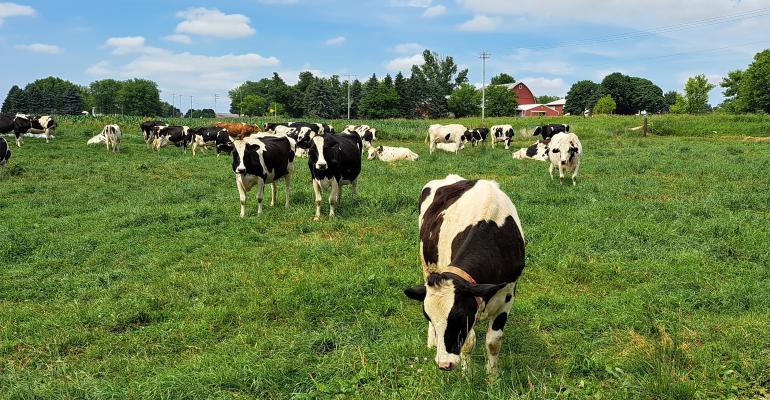The deal reached this past weekend to end European Union (EU) retaliatory tariffs on U.S. corn and...
Bird Flu Pushes U.S. Dairy Farmers to Ban Visitors, Chop Trees

Dairy farmers in the United States are raising their defenses to try to contain the spread of bird flu: banning visitors, cutting down trees to discourage wild birds from landing, and disinfecting vehicles coming onto their land.
North Carolina recently became the seventh state to report an outbreak of highly pathogenic avian influenza (HPAI) in a dairy herd, after the U.S. Department of Agriculture confirmed infections in Texas, Kansas, Ohio, Michigan, Idaho and New Mexico.
While the first cases appear to have been introduced to herds in Texas and Kansas by wild birds, the USDA said transmission among cattle was also possible. Agricultural officials in Michigan and Ohio said infected herds in those states received cattle from Texas.
Reuters spoke to seven dairy farmers in five states who said they are reinforcing safety and cleaning procedures, with three producers exceeding government recommendations.
"Think of our farm now as a gated community for cows," said Karen Jordan, who raises about 200 dairy cattle in Siler City, North Carolina. "Only the most essential person can get past the gate."
Even before North Carolina's outbreak, Jordan said she was limiting visitors who could unintentionally carry in contaminated bird droppings on boots or vehicles. She also started chopping down about 40 small trees to avoid attracting wild birds during spring migration.
The first confirmed case in a dairy herd on March 25 and the second human case in two years on April 1 have heightened concerns in the U.S. about the spread of the virus to animals and people. Bird flu has decimated poultry flocks globally since 2022 and infected mammals ranging from seals and foxes to skunks.
The U.S. Centers for Disease Control and Prevention said the risk to humans remains low, but has asked states for plans to test and treat potentially impacted farm workers.
Reduced milk production
While bird flu is lethal to poultry, cows appear to recover. The outbreaks in dairy herds primarily affect lactating cows, according to the USDA, reducing milk production and requiring farmers to isolate sick animals while keeping their milk out of the food supply.
U.S. milk production grew to nearly $60 billion in 2022. Dairy farmers now fear a drop in demand for milk and cheese, after the USDA reported bird flu in unpasteurized milk samples, though agricultural officials say pasteurized milk is safe.
Futures prices for milk DCSK24 dropped as infections expanded recently, before the market rebounded. Beef cattle futures also plunged on fears of reduced demand, although there have been no confirmed cases of the virus in cattle raised for meat.
The USDA has not issued quarantine orders for infected dairy herds but has recommended minimizing the movement of cattle, as well as testing milk samples from lactating cows if they must be moved. Producers were also urged to monitor livestock for illnesses; isolate newly added cows; and keep wildlife and domestic pets like cats away from farm buildings to reduce the spread of the virus.
The agency advised farmers to pay "special attention to good milking practices, such as equipment disinfection." In interviews with Reuters, animal-health authorities raised the possibility that milking machines may play a role in spreading infections among cows, though that has not been confirmed.
Seven state and industry officials said farmers face challenges because of uncertainty over how the virus is spreading and the exposure of open-aired barns to wild birds.
Idaho, North Carolina and more than a dozen states that have not confirmed cases in cattle imposed additional requirements on shipments to protect their herds.
Nebraska, the second-biggest U.S. cattle producer after Texas, on April 1 began requiring producers to obtain permits to bring breeding dairy cows into the state so officials can better track animal movement.
Texas advised producers to monitor their herds and keep sick animals at home. “Kansas recommended limiting the movement of cattle, but has not mandated extra restrictions,” said Justin Smith, the state's animal health commissioner. “These dairies have got a lot at stake. If they have concerns about that movement, they need to reassess it, versus me mandating a reassessment."
In Fort Branch, Indiana, Steve Obert is requiring drivers to spray truck wheels with disinfectant before he allows them on his farm. He raises about 1,200 cows that produce milk for Dairy Farmers of America, a cooperative of more than 6,000 farms.
Farmers are also trying to keep wild birds away from feed supplies but it is difficult. "The dairy farm is like a giant bird feeder," said Jamie Jonker, chief science officer for the National Milk Producers Federation.
EDITOR’S TAKE:
Bird flu has been a regular on our radar screen the past several weeks, but we feel the topic is important because of its persistence and spreading influence on agricultural production. It goes without saying, issues such as this can have a detrimental impact on farmers and potentially consumers. It can also have a negative effect on truck sales in the impacted areas. It appears that the spread to cattle is of less concern than what has been experienced by the poultry industry. That is good news. For the time being, the financial impact of this latest version of the bird flu seems to be minimal and we hope that continues. That said, keep posting your inventory on AgTruckTrader.com®. If you’re not already doing that, ask yourself – why? It is included with your CAD membership!







